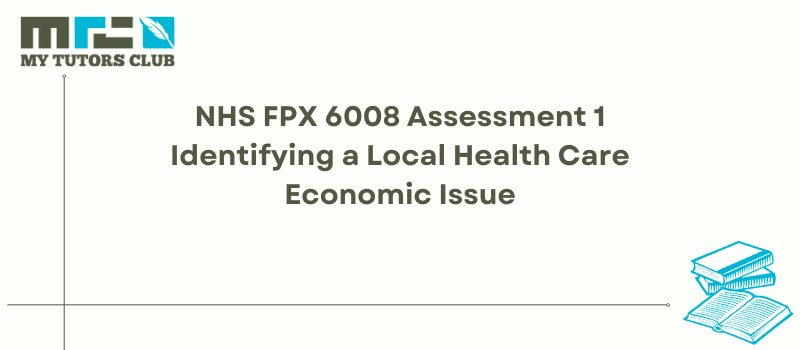NHS FPX 6008 Assessment 1 Identifying a Local Healthcare Economic Issue
The elevated extent of the cases of unsuccessful heart failure re-hospitalization at the Concord Medical Center (CMC) in California is a healthcare economic question on the local level. In most cases, hospitalization is a vital requirement for those with heart failure because it is chronically systemic. As the project progressed, we discovered that many heart failure patients (Al-Tamimi et al., 2021) were readmitted to the healthcare system within a month following the discharge, which is a big challenge for the interviewee and the system itself. Along with different factors that lead to increased hospital readmission for people with heart failure, there are the patients’ non-compliance to the prescription medications, not being well taken care of themselves, and NHS FPX 6008 Assessment 1 lack of social support.
Healthcare Economic Issue
Concord Medical Center is confronted with a substantial financial problem associated with patients with heart failure who get re-admitted, and this is true in particular for the nurses who take care of the patients. Besides these, there might be other effects, such as the extension of working hours, overworked nurses, and a possible decrease in job satisfaction. Readmissions can have a significant financial impact on patients, including deductibles, etc. These expenses can be particularly stressful for people with tight budgets or inadequate resource access (Upadhyay et al., 2019). Also, people who need to return to the hospital may have to take leave to get care, which means they lose money and time.
Readmissions might result in significant expenses for healthcare professionals, another critical consideration. Further diagnostic tests, therapies, and procedures may be required due to re-hospitalization, raising the cost of healthcare overall (Kanaoka et al., 2019). Consequently, hospitals risk receiving financial penalties from the government for having high readmission rates. NHS FPX 6008 Assessment 1 The Centers for Medicare and Medicaid Services (CMS), which regulates Medicare and Medicaid, started fining hospitals in 2012 with rising hospital readmissions for certain diseases, such as heart failure (Aswani et al., 2018). These fines might significantly affect hospital income, substantially affecting already limited budgets and impacting the low socio-economic population of California State. Consequently, it will raise healthcare costs and result in inadequate quality care.
High readmission rates for heart failure patients can cost money, so Concord Medical Center might have to employ multiple strategies to fix the problem. One possible strategy is to put money into far more healthcare system management initiatives for individuals who have heart failure. Some of the services that might be part of these programs are health promotion, medication adherence, and care after a patient is released from the hospital. By helping people with heart failure in more ways, Concord Medical Center could cut down on readmissions and the costs of chronic diseases.
The Rationale for Choosing the Issue
The topic of high re-hospitalization rates for heart failure patients at Concord Medical Center was chosen for numerous reasons. First, heart failure is a significant health problem affecting many California residents. Over 6.122 million people in the United States of America suffer from heart failure, and the disease causes more than 385,000 deaths annually, as reported by the American Heart Association (American Heart Association News, 2019).
Heart failure has significant consequences on patients’ lives and the care system but has substantial financial consequences. NHS FPX 6008 Assessment 1 repeated hospital stays for patients with heart failure are associated with high direct and indirect expenditures that might harm healthcare budgets nationwide (OECD, 2020). As healthcare prices increase, clinicians and politicians alike recognize the importance of minimizing re-hospitalizations and improving the quality of care to control these rising expenditures.
NHS FPX 6008 Assessment 1
As a nurse at Concord Medical Center, the high re-hospitalization rate with heart failure issues affected my work burden and decreased my job satisfaction. It also significantly influences the turnover rate, increases medication errors, and causes poor patient care and treatment. The high rate of re-hospitalizations for heart failure patients at Concord Medical Center is a local problem, making it easy to pinpoint causes and determine relevant stakeholders. Identifying core problems and possible opportunities and directly engaging stakeholders throughout the process of creating and executing solutions may be facilitated by narrowing the scope of the investigation to a single healthcare system and problem.
High re-hospitalization rates among Concord Medical Center’s heart failure patients are a serious and complicated problem with far-reaching social and financial consequences. If this problem is solved, healthcare outcomes will improve, healthcare costs will go down, and the healthcare system as a whole will be more sustainable and efficient.
Effects of Healthcare Economic Issues
One direct effect of more patients needing readmission because of heart failure is shouldering a higher nursing workload. Patients might need more time and money as they will need continuous adjustments upon their readmission and treatment thus (Urbich et al., 2020). Examples of nursing interventions are drug usage, wound dressing, and medication management, which hinder re-admissions. Suffer from recovery, exhaustion, and other highly negative consequences when hospitalized repeatedly for a long time. Using appropriate keyboard skills is essential for anyone working with digital devices, whether for educational, professional, or personal purposes. In this fast-paced digital age, keyboarding techniques have become integral to our daily routines as we navigate different platforms and applications. However, we tried our best, repeated re-hospitalization of heart failure patients short-term us, the patient, and the overall health system NHS FPX 6008 Assessment 1.
NHS FPX 6008 Assessment 1 Failure patients affected
High re-hospitalization of heart failure patients affected me, my colleague, and the healthcare system as a whole. It increases burnout, and medication errors decrease job satisfaction and increase our turnover rates. Re-hospitalization rates increase healthcare-related costs and decrease the reputation of the healthcare system. On the other hand, nurses may feel helpless if they cannot give their patients the care they deserve because of limited resources or other issues outside their authority.
Overall, nurses at Concord Medical Center felt the effects of the hospital’s high re-hospitalization rates for individuals with heart failure. Nursing exhaustion, dissatisfaction with one’s profession, and greater patient care demands have been linked to poorer health results and increased healthcare costs. Improving coordination of care, patient participation, and allocation of resources, in addition to providing more support and autonomy to staff nurses, are all essential to resolving the issue of high re-hospitalization.
Impact on Lower Socio-economic Group
NHS FPX 6008 Assessment 1 High re-hospitalization rates for patients with heart failure at Concord Medical Center may have a disproportionately negative cost impact on lower socio-economic groups. Lower socio-economic group members may experience difficulties accessing and receiving high-quality healthcare services due to inadequate financial means, medical insurance, and a lack of preventative services.
The likelihood of developing heart failure and its associated problems and the possibility of being hospitalized and readmitted might all rise due to these risks (Roger, 2021). There is also the pattern where people with diabetes and hypertension enter the disease picture and increase the chance of multiple hospitalizations during an exacerbation. Such circumstances are to be found in higher proportions among people with relatively poor societal income levels. Frequent readmissions of heart failure patients are not only clinically significant but have even worse economic consequences for poor people specifically, though the already mentioned ones. Hospital stays may be repetitious and cause co-pays and charges, which might not be affordable for those who are poor.
NHS FPX 6008 Assessment 1 Gap to Address the Issue
Cuts in the excessive hospitalization rates of Concord Medical Center’s heart failure patients across the service delivery system could only be possible by discovering and correcting weaknesses in the current service process. Among the most influencing issues of increasing readmission numbers are patient disempowerment and lack of healthcare knowledge. Heart failure patients lack disease knowledge and often are in the dark about how their disease will affect them. Of course, because bodily function can be downturned, the medical condition can worsen, and the patient may have to be admitted to the hospital again. Repeated discharge and readmission of heart failure patients are identified as significant challenges, as evidenced by a study conducted by Concord Medical Center in California (NHS FPX 6008 Assessment 1).
This article discusses a possible explanation for this pattern: patients are ignorant about the condition of their illness, resulting in them making a uniform decision that adversely impacts their health. Such a lack of understanding would be a considerable hindrance to the proper care and management of their condition; thus, over time, their health may decline so much that they would need to be hospitalized frequently. Implying this, the fact that patients are conscious of self-care and empowerment in HF treatment means a lot, as it proves the outcomes of the treatment plan. Packing patients with the necessary information and pointing them to community resources can give them the power to avoid future readmissions and recover faster from their current state.
Conclusion
NHS FPX 6008 Assessment 1 Heart failure re-hospitalization of a patient is one of the severe financial issues occurring in the healthcare system, which Concord Medical Center helps in coming up with solutions. This problem might become the main ambulatory for nurses, poor people, and the healthcare system. The issues of patient education, care coordination, and preventative care gaps should be considered in order to strive to find the correct answer. Therefore, we should highlight these issues. Healthcare providers could prevent readmissions and improve the quality of care by using various educational programs, interventions between patients’ families, and online platforms. A system-wide strategy for this issue will help us provide better care to heart failure patients, significantly reducing the healthcare system’s cost.
References
Al-Tamimi, M. A.-A., Gillani, S. W., Abd Alhakam, M. E., & Sam, K. G. (2021). Factors associated with hospital readmission of heart failure patients. Frontiers in Pharmacology, 12. https://doi.org/10.3389/fphar.2021.732760
American Heart Association News. (2019). Cardiovascular diseases affect nearly half of the American adults, statistics show. www.heart.org. https://www.heart.org/en/news/2019/01/31/cardiovascular-diseases-affect-nearly-half-of-american-adults-statistics-show
Aswani, M. S., Kilgore, M. L., Becker, D. J., Redden, D. T., Sen, B., & Blackburn, J. (2018). Differential impact of hospital and community factors on medicare readmission penalties. Health Services Research, 53(6), 4416–4436. https://doi.org/10.1111/1475-6773.13030
CMC. (2019). John Muir Medical Center Campus. Hcai.gov. https://hcai.ca.gov/facility/john-muir-medical-center-concord-campus/
CMS. (2019). CMS’ value-based programs. Cms.gov. https://www.cms.gov/Medicare/Quality-Initiatives-Patient-Assessment-Instruments/Value-Based-Programs/Value-Based-Programs
Kanaoka, K., Okayama, S., Nakai, M., Sumita, Y., Nishimura, K., Kawakami, R., Okura, H., Miyamoto, Y., Yasuda, S., Tsutsui, H., Komuro, I., Ogawa, H., & Saito, Y. (2019). Hospitalization costs for patients with acute congestive heart failure in Japan. Circulation Journal, 83(5), 1025–1031. https://doi.org/10.1253/circj.CJ-18-1212
OECD. (2020). The economics of patient safety from analysis to action. Oecd.org. https://www.oecd.org/health/health-systems/Economics-of-Patient-Safety-October-2020.pdf
Roger, V. L. (2021). Epidemiology of heart failure. Circulation Research, 128(10), 1421–1434. https://doi.org/10.1161/circresaha.121.318172
Upadhyay, S., Stephenson, A. L., & Smith, D. G. (2019). Readmission rates and their impact on hospital financial performance: A study of Washington hospitals. INQUIRY: The Journal of Health Care Organization, Provision, and Financing, 56, 004695801986038. https://doi.org/10.1177/0046958019860386
Urbich, M., Globe, G., Pantiri, K., Heisen, M., Bennison, C., Wirtz, H. S., & Di Tanna, G. L. (2020). A systematic review of medical costs associated with heart failure in the USA (2014–2020). PharmacoEconomics, 38(11), 1219–1236. https://doi.org/10.1007/s40273-020-00952-0




